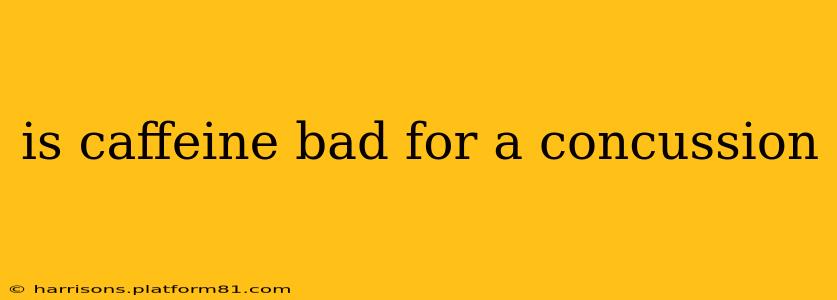A concussion, a type of traumatic brain injury (TBI), disrupts the brain's normal function. While recovery varies greatly from person to person, one common question revolves around caffeine consumption: is caffeine bad for a concussion? The answer isn't a simple yes or no. The effects of caffeine on concussion recovery are complex and depend on several factors, including the severity of the concussion, individual sensitivities, and the amount of caffeine consumed.
What Happens to Your Brain After a Concussion?
Before we delve into caffeine, let's briefly understand what occurs after a concussion. A brain injury, even a mild one, causes inflammation, impacting brain cells and their communication. This can lead to a range of symptoms, from headaches and dizziness to cognitive difficulties like memory problems and concentration issues. The brain needs time and rest to heal, and during this period, it's crucial to avoid anything that could potentially hinder the recovery process.
Does Caffeine Exacerbate Concussion Symptoms?
Caffeine is a stimulant known for its ability to increase alertness and reduce fatigue. However, this stimulating effect can also be problematic for individuals recovering from a concussion. Some studies suggest that caffeine may worsen certain concussion symptoms, particularly headaches and anxiety. The heightened alertness caffeine provides may also clash with the need for rest and reduced mental stimulation crucial for brain recovery. Furthermore, caffeine's diuretic effect can lead to dehydration, and dehydration can negatively impact brain function and recovery.
How Much Caffeine is Too Much After a Concussion?
There's no universally agreed-upon limit for caffeine intake after a concussion. The optimal amount varies considerably depending on individual tolerance and the severity of the injury. What's crucial is to listen to your body. If you experience any worsening of symptoms—headaches, dizziness, increased anxiety, or difficulty sleeping—after consuming caffeine, it's essential to reduce or eliminate your intake. It's always best to err on the side of caution and prioritize a slow and gradual reintroduction of caffeine into your diet, if at all.
What are the common symptoms of a concussion?
Concussion symptoms are varied and can range from mild to severe. Common symptoms include headache, dizziness, nausea, vomiting, balance problems, blurred vision, sensitivity to light and sound, confusion, memory problems, difficulty concentrating, fatigue, and sleep disturbances. The severity and duration of these symptoms depend on the individual and the severity of the injury. Some individuals may experience post-concussion syndrome (PCS), where symptoms persist for weeks, months, or even longer.
Can caffeine interfere with sleep after a concussion?
Sleep is crucial for brain repair and recovery after a concussion. Caffeine's stimulating effect can significantly interfere with sleep, potentially prolonging recovery time. Individuals recovering from a concussion should prioritize getting sufficient, high-quality sleep, and caffeine should be avoided, particularly in the evening, to promote better sleep hygiene.
Should I avoid all stimulants after a concussion?
While caffeine is a common concern, other stimulants, such as nicotine and alcohol, should also be avoided after a concussion. These substances can further stress the brain and impede the healing process. Focusing on a healthy lifestyle that promotes rest, proper nutrition, and hydration is crucial for optimal recovery.
When can I safely resume caffeine consumption after a concussion?
There's no set timeline for resuming caffeine consumption after a concussion. It's a highly individualized process. It's crucial to consult with a healthcare professional, such as a doctor or neurologist, for guidance. They can assess the severity of the injury, monitor your progress, and advise you on when and how to safely reintroduce caffeine back into your diet, if at all. Remember, prioritising your brain's recovery is paramount.
Disclaimer: This information is for educational purposes only and should not be considered medical advice. Always consult with a healthcare professional for diagnosis and treatment of any medical condition, including a concussion. This article does not provide medical advice and does not replace consultation with a healthcare professional.
